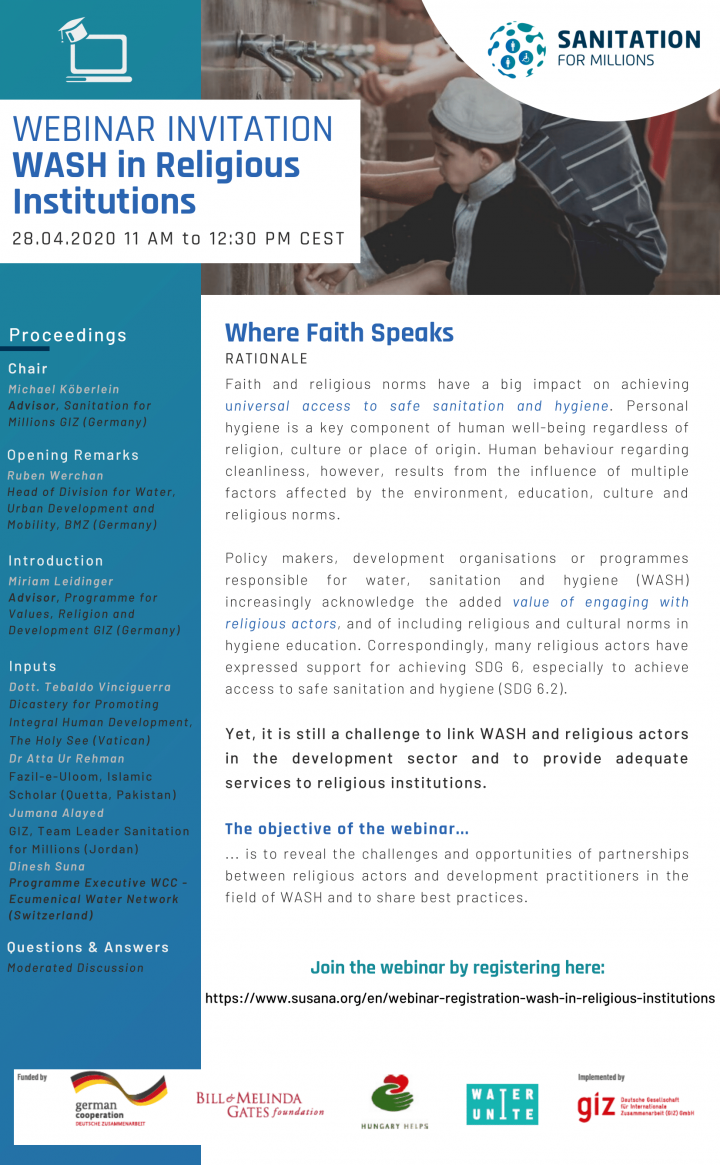
Published in: 2020
Publisher:
Deutsche Gesellschaft für Internationale Zusammenarbeit (GIZ) GmbH, Eschborn, Germany
Author:
GIZ
Uploaded by:
SuSanA Admin
Partner profile:
Deutsche Gesellschaft für Internationale Zusammenarbeit (GIZ) GmbH
2138 Views
127 Downloads
In this webinar development practitioners and religious actors shared their experiences in collaborating to jointly achieve the fulfillment of SDG 6.2. . The speakers showcased best practices and innovative approaches and elaborate their view on the importance of religious actors on achieving universal access to water, sanitation and hygiene.
Unfortunately there were technical difficulties towards the end of the webinar - the recordings of the missing presentations will be released at a later stage.
Rationale:
Faith and religious norms have a big impact on achieving universal access to safe sanitation and hygiene. Personal hygiene in terms of handwashing is a key component of human well-being regardless of religion, culture or place of origin. Human behaviour regarding cleanliness, however, results from the influence of multiple factors affected by the environment, education, culture and religious norms. For instance, hand cleansing as a measure of preventing the spread of disease is clearly in harmony with the fundamental Hindu value of non-injury to others (ahimsa) and care for their well-being (daya). Muslims, for instance, only pray when they are in a ritual state of purity, free from any physical impurities and uncleanliness. To this end, ritual ablutions (wudu) are necessary before each formal prayer to be in a state of purity.
Hence policy makers, development organisations or programmes responsible for water, sanitation and hygiene (WASH) increasingly acknowledge the added value of engaging with religious actors, and of including religious and cultural norms in hygiene education. Correspondingly, many religious actors have expressed support for achieving SDG 6, especially to achieve access to safe sanitation and hygiene (SDG 6.2). Yet, it is still a challenge to link WASH and religious actors in the development sector and to provide adequate services to religious institutions.
Sanitation for Millions has effectively engaged with Islamic religious actors in Jordan and cooperates with the Ministry of Islam and Holy Places since 2017 on WASH in mosques and shrines. The main objective in Jordan is to provide safe sanitation and hygiene at holy places and to draw on religious actors such as Waithats and Imams for awareness creation on safe hygiene and cleanliness. The same concept is intended to be applied in other region with further religious actors as well.
Since religion is defining many people’s worldviews, their way of life, their civic engagement and their hygiene practices, it is a meaningful factor for the achievement of the SDGs. Thus, we believe that it will not be possible to implement the Agenda 2030 unless the religious communities become active partners in the overall endeavor.
Chair:
Michael Köberlein, Sanitation for Millions, GIZ
Opening Remarks:
Ruben Werchan, Head of Division 413, Water, Urban Development & Mobility, BMZ
Introduction:
Miriam Leidinger, Sector Programme Values, Religion and Development, GIZ
Inputs:
Tebaldo Vinciguerra, Dicastery for Promoting Integral Human Development, The Holy See (Vatican)
Dr. Atta Ur Rehman, Fazil-e-Uloom, Islamic Scholar, Quetta, Pakistan
Dinesh Suna, Programme Executive of the World Council of Churches (WCC)
Jumana Alayed, Team Leader Sanitation for Millions, Jordan
Bibliographic information
GIZ (2020). Webinar - Where Faith Speaks: WASH in Religious Institutions. Deutsche Gesellschaft für Internationale Zusammenarbeit (GIZ) GmbH, Eschborn, Germany
Filter tags
English Presentations Videos and webinar recordings















